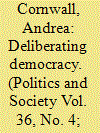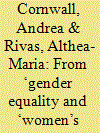|
|
|
Sort Order |
|
|
|
Items / Page
|
|
|
|
|
|
|
| Srl | Item |
| 1 |
ID:
085014


|
|
|
|
|
| Publication |
2008.
|
| Summary/Abstract |
Brazil's health councils appear to offer inspiring examples of what Fung and Wright (2003) term "empowered participatory governance." But what happens in practice? This article narrates an episode in the life of a municipal health council in northeast Brazil, in which democracy itself came under deliberation. It seeks to locate normative assumptions embedded in theories of deliberative democracy and participatory governance in everyday conduct in one of these institutions. It suggests that assessing the democratizing potential of the myriad new spaces that now populate governance landscapes the world over calls for far closer attention to be paid to power, political culture, and politics.
|
|
|
|
|
|
|
|
|
|
|
|
|
|
|
|
| 2 |
ID:
137743


|
|
|
|
|
| Summary/Abstract |
The language of ‘gender equality’ and ‘women’s empowerment’ was mobilised by feminists in the 1980s and 1990s as a way of getting women’s rights onto the international development agenda. Their efforts can be declared a resounding success. The international development industry has fully embraced these terms. From international NGOs to donor governments to multilateral agencies the language of gender equality and women’s empowerment is a pervasive presence and takes pride of place among their major development priorities. And yet, this article argues, the fact that these terms have been eviscerated of conceptual and political bite compromises their use as the primary frame through which to demand rights and justice. Critically examining the trajectories of these terms in development, the article suggests that if the promise of the post-2015 agenda is to deliver on gender justice, new frames are needed, which can connect with and contribute to a broader movement for global justice.
|
|
|
|
|
|
|
|
|
|
|
|
|
|
|
|
| 3 |
ID:
085174


|
|
|
|
|
| Publication |
2008.
|
| Summary/Abstract |
This paper argues for an approach to researching citizenship and democracy that begins not from normative convictions but from everyday experiences in particular social, cultural and historical contexts. The paper starts with a consideration of the ways in which the terms 'democracy' and 'citizenship' have been used in the discourses and approaches taken within mainstream studies of citizenship and democracy, drawing attention to some of the conceptual blind spots that arise. We call for more attention to be paid to contextual understandings of the politics of everyday life, and to locating state, ngo and donor rhetorics and programmes promoting 'active citizenship' and 'participatory governance' within that politics. It is this kind of understanding, we suggest, that, by revealing the limits of the normativities embedded in these discourses, can provide a more substantive basis for rethinking citizenship from the perspectives of citizens themselves.
|
|
|
|
|
|
|
|
|
|
|
|
|
|
|
|
| 4 |
ID:
116855


|
|
|
|
|
| Publication |
2012.
|
| Summary/Abstract |
The World Bank's Consultations with the Poor made development history. One of the most widely discussed piece of development research ever, the Consultations made much of claims to be participatory and to represent the ''voices'' of more than 20,000 ''poor people'' in 23 countries. It findings were used to garland speeches and affirm the overwhelming approval of ''the poor'' for the bank's policy prescriptions, lending them narrative form and moral legitimacy. More than a decade later, references are still made to the ''voices of the poor''. As the MDG deadline draws closer, there is talk of repeating the exercise to inform the next round of goals. In this article, we look back at this exercise, and examine the methodology that was used to ''listen'' to ''the voices of the poor''. Taking one of the regions where the studies were done, Latin America, we trace quotes through from site reports to synthesis. Our findings offer no surprise to those familiar with what Broad describes as the Bank's exercise of the ''art of paradigm maintenance''. But it offers useful pause for reflection on the politics of knowledge production and the encounters between international development agencies and those whom they would call their ''clients''.
|
|
|
|
|
|
|
|
|
|
|
|
|
|
|
|
| 5 |
ID:
065724


|
|
|
|
|
|
|
|